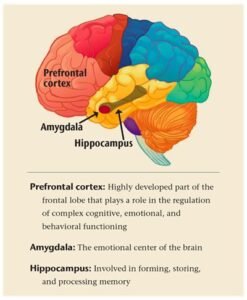Good Morning, everyone!
It’s April, and in most schools, the new academic session begins. For many three-year-olds, today marks their very first day of school. The day is filled with a mix of anxiousness and excitement—not just for parents and children but also for teachers, caregivers, and school staff.
We all know that kids catch viral infections like colds, coughs, or stomach bugs quickly due to their developing immunity. The sources can be anything—school, the bus they travel in, weather changes, or exposure to a new environment. But do you know what they catch even faster? Negative emotions—fear, anxiousness, worry, uncertainty, sadness. And the primary source of these emotions is none other than the parents.
The good news? There’s something else they catch even quicker—positive emotions like happiness, calmness, confidence, and certainty. And when these emotions come from parents, they multiply and deeply influence the child’ mental well being.
Dear Parents, Here’s What You Can Do
Before worrying about your child’s emotional state, work on becoming aware of your own emotions and managing them. Children pick up on your energy, so make sure you’re passing on confidence and assurance rather than fear and doubt.
- Managing Separation Anxiety
Parents also feel separation anxiety. Thoughts like “How will my child stay without me? Will they eat properly? Will they ask for help when needed? How will they adjust to the new environment and people?” are completely normal. But trust me, children—just like us, or perhaps even better than us—adjust to new environments when given the chance.
✅ Tools to Help:
- Practice short separations by leaving them with trusted caregivers before school starts. This gives both you and your child an idea of how they handle separation.
🗨 Helpful Dialogues:
- “Yes, beta, I will miss you too! I will keep thinking about you. Why don’t we exchange something? You take my handkerchief, and I’ll keep your toy. Whenever we miss each other, we can look at these things and smile!”
- Adjusting to a New Environment
Yes, the school is a new place for your child, but you have chosen it after careful research and reviews. Trust the process and feel confident about your decision. Once you are sure, do not let doubt creep in again.
✅ Tools to Help:
- Take your child for a school visit beforehand. Let them explore their classroom, meet the teacher, and get comfortable with the space.
- Make a mental checklist of things that are important to you in school, and ensure they meet your expectations during the visit.
🗨 Helpful Dialogues:
- “I love your classroom! It looks so nice and colorful. Your teacher seems really kind. You’re going to have such a good time here!”
- Trusting Teachers & Caregivers
The teacher in pre-schools are well trained, from time to time, and do have a lot of experience in managing a child on their first few days of school. So when you hand over your child, the child should feel your comfort and confidence during the bye-bye time. Parents usually use words of encouragement like “the teacher is so nice” “she will be there to take care of you” “look there are so many other kids” “ you will enjoy with the toys and games” etc. All good, all nice. But then you still linger around. Your face says something else, like you really don’t mean those words, that you doubt whether they are really nice people or not to stay with. So the kids will get confused. Like I said, they will pick up your emotion of fear, doubt, anxiousness and may start crying. which inturn will now add to your doubts. The cycle goes on!
✅ Tools to Help:
- Create a goodbye ritual to make parting easier. For example, I always hug my kids and say, “Enjoy your day!” and they reply, “Yes, I will!” Then I turn around and leave.
🗨 Helpful Dialogues:
- “I’ve heard so many good things about your teacher. I think she’ll be wonderful! You tell me what you think about her when you come back.”
- Socializing with Classmates
Parents often worry about how their child will get along with other kids. Remember, all children in the class are of the same age and likely experiencing similar anxieties. They will gradually learn important social skills like sharing, waiting for turns, following instructions, and understanding that they are not always in control.
✅ Tools to Help:
- Encourage open conversations about their day.
- Ask open-ended questions instead of just “So how was school today?”
🗨 Helpful Questions:
- “What was the most exciting part of school today?”
- “What made you laugh?”
- “How do you sit when you eat your snacks?”
- Preparing Your Child Emotionally
The way you talk about school makes a huge difference. Share positive stories about your own school days. If your child is reluctant, acknowledge their feelings while reinforcing the importance of going to school.
✅ Tools to Help:
- Empathize while keeping it light. My younger one hated school and cried every morning. I would say: “I understand you don’t like school, beta. But it’s important—just like my office is important. How I wish we could stay home all day cuddling! But alas, we can’t. So let’s go, and we’ll look forward to the evening together.”
- Teach them independence in small ways—washing hands, eating on their own, keeping track of their belongings, asking for help when needed.
- Establishing a Smooth Routine
A predictable routine makes transitions easier. School mornings should be calm, not chaotic.
✅ Tools to Help:
- Align your child’s sleep schedule with school timings at least a month in advance.
- If your child takes time to wake up and get ready, wake them 15 minutes earlier. A little less sleep is better than a rushed, stressful morning.
A child who leaves for school happily, not hurriedly,will have a better day overall. They can always catch up on sleep later!
Final Thought: The first few days might be challenging, but trust that your child will settle in. Your confidence, positivity, and trust in the school will make all the difference. Let them go, and watch them thrive!











 aring for a child—it’s about how becoming a mom transforms us from the inside. The moment we step into the role of “mom,” everything changes, and not just in our daily routines. It changes who we are, how we see ourselves, and what we believe we’re capable of.
aring for a child—it’s about how becoming a mom transforms us from the inside. The moment we step into the role of “mom,” everything changes, and not just in our daily routines. It changes who we are, how we see ourselves, and what we believe we’re capable of.




